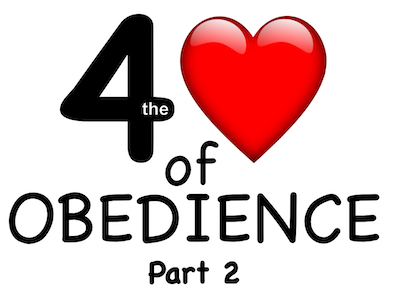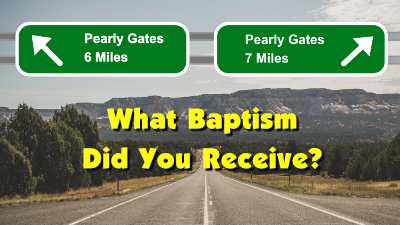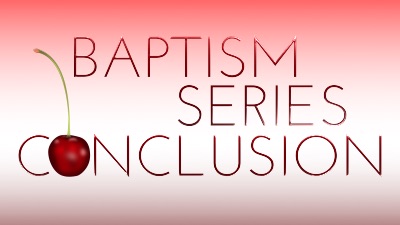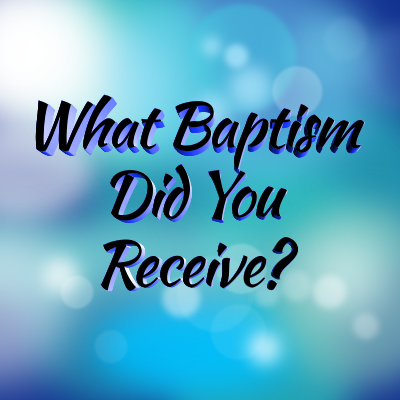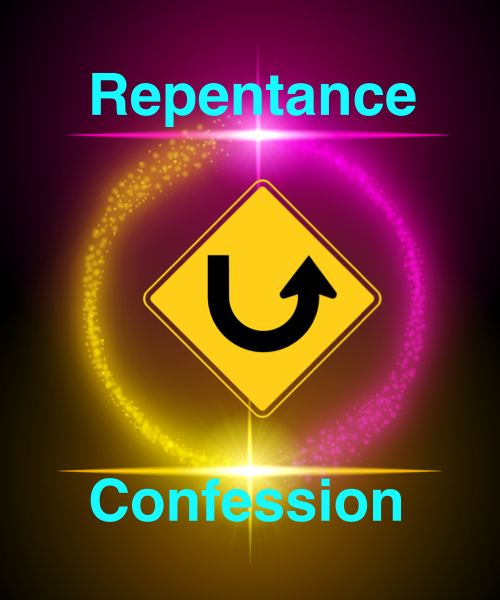
Editor’s Note: This is the fifth lesson from our eleven part video series called, “A Faith that Obeys.” You can find the original video and transcript HERE. We are dropping this lesson into our regular podcast feed so that the information can reach a wider audience. In this lesson, we will review the the next two steps in the Biblical Plan of Salvation which are, Repentance and Confession of Christ.
Hearing and Accepting Come First
When someone hears the word and accepts it, they have taken the first two steps in the Biblical Plan of Salvation. God, at this point, gives them something they previously did not have. They now have the right or the power to become a child of God. Hearing and accepting the message are great first steps and it’s clear from the scriptures we are placed into a different spiritual classification than we were in before we accepted the message. It indicates a soft heart, a willing heart, a heart that we still must have… but the commands, as required by God, are not yet completed with just these two steps.
In Matthew 7:21 Jesus said: Not everyone who says to me, Lord, Lord, will enter the kingdom of heaven but only he who does the will of my Father who is in Heaven.
Doing the Will of God
Did you notice something? Jesus just said the same thing we have been saying. It is not enough of call him Lord, or to simply believe in Him. There is something else we must obey. What is it? Doing the will of God! This is our goal, to do the will of the Father. This is a call to action. Based on what we have seen so far, have you noticed anything in the passages we’ve examined which we could do or act upon? You know, actions we could take which might be considered, “doing the will of the Father?” We already know the first two actions, hear the word and accept the word. These are both things God tell’s us to do. But there was something else in those passages which we may have missed. Remember, we are looking for Biblical commands or religious events which happen in a believer’s life and we are carefully trying to determine if those events are in any way connected with the forgiveness of sins. When we find one, we want to see if the forgiveness of sins or the idea of being saved happens before this event or after this event.
Let’s look at those two previous passages again. Here’s the passage which told us about hearing the word.
James 1:21 Therefore, get rid of all moral filth and the evil that is so prevalent and humbly accept the word planted in you, which can save you.
Do you see it? It’s right at the beginning. There is something in addition to hearing and accepting the word which precedes salvation. It’s something we must DO. Yep, getting rid of all moral filth from our lives. In religious terms, this is called repentance. The word repent means to change one’s mind or purpose. It means to stop doing wrong things and start doing right things. It’s like a U-turn. You were going one direction… now you’re going a new direction.
Repentance Always Comes Before Conversion
Now, this is critical. Notice that repentance also comes before salvation! Repentance, as it relates to the issue of the “Born Again” experience or the forgiveness of sins, never occurs anywhere in the Bible after someone is saved. While it is true that people will still sin after they are saved and they will continue in repentance, this is vastly different from the need to repent, or “get rid of all moral filth,” before they are saved.
But, let’s carefully check this out. Biblically speaking, is repentance from sin really necessary to be saved? After all, this is an act which is squarely on our shoulders. This is a specific action we take. Some people might even suggest that this a kind of works salvation since it is something we do. Once again let’s turn to the scriptures to find out.
Acts 3:19 Repent, then, and turn to God, so that your sins may be wiped out, that times of refreshing may come from the Lord,
Well, this is pretty clear! Does repentance come before sins are wiped out or after? Before. Is repentance a suggestion? No. Is it optional? No. Is it a command we can obey? Sure!
Let’s mark the third step on our illustration, “Repentance” and let’s move that line of salvation up the stairs just a little bit because it is obvious, repentance precedes the forgiveness of sins and that is consistent throughout all of scripture.
But Repentance Alone is Not Enough
Let me interject a quick personal note here. Over the years, I’ve had many religious friends who believe that accepting Christ is all one needs to do in order to be saved. When I show them this very clear, very obvious command and requirement in the plan of salvation and that it precedes the forgiveness of sins, they easily agree because it is so obvious, but suddenly realize there are no longer just two steps, as they previously believed. Things start to get a little uncomfortable. It’s just too hard argue with this. This passage is easy to understand. We must repent before sins are forgiven. If you are feeling defensive, take a breath, pray. God is showing you something really awesome and I have a feeling, He would not be doing this if he has not seen something in your heart which is ready to hear it.
Finally, I want to show you something interesting. There was a really small but important word used in both of these two passages. It is the word “and.”
Look how it is used in James 1:21 and Acts 3:19. It locks together two clauses. This is referred to by linguists as a “coordinating conjunction.” This conjunction means that we can’t get to the solution if we don’t do both of the things the scripture is telling us to do! We can’t pick and choose! You will be amazed how significant this little conjunction will become in our future studies. Where the Bible connects two things together in the plan of salvation, we must leave them connected. The Bible can’t be altered!
Confession of Jesus as Lord
Now, let’s talk about the fourth step. We have already seen this one too. Do you know what it was? Let’s look at the other one of our earlier passages again.
Romans 10:9 That if you confess with your mouth, Jesus is Lord, and believe in your heart that God raised him from the dead, you will be saved.
I’ll bet you just noticed the word “and,” didn’t you? This was the passage where we connected belief with salvation. But notice, confessing Jesus as Lord is just as important too! And take a look, it also precedes salvation.
So, let’s add “Confession” to our illustration as the fourth step. And let’s move that line which indicates the forgiveness of sins upward as well. Now the Biblical plan of salvation looks like this. Hear, Accept, Repent, and Confess. Very simple, very clear, very Biblical. If we do not obey these four commands, we have not obeyed the Gospel and sins have not yet been forgiven, regardless of what we may have felt or experienced. We do not rely on our emotions as our confirmation of truth, we rely only on the scriptures.
It’s Not a Buffet
At this point, we have four very clear steps which occur in the Biblical plan of salvation. But I’m an American! I have choices. I have rights! What if I decided to pick and choose which ones I wanted to do? Do you think God would accept that? What if the only thing I wanted to do was repent… you know… get my life cleaned up? Would that be enough? Can I repent of my sins but reject the Gospel or refuse to confess Jesus as Lord and still be saved? Of course not. It’s obvious that all of the things we have looked at so far are part of a Biblical plan of salvation. They all come before the forgiveness of sins. We must obey all four, not just the ones we favor or like. This is where dangerous traditions take a powerful, and sometimes aggressive stand. When the defenses go up, the arguments start. We hear things like: “But this is how my church does it.” or “This is what the Pope says.” or “This is how we have always done it!” Don’t walk on that road. Turn away from traditions, turn into the Bible.
Let’s move on. I want to introduce the fifth step in the Biblical Plan of Salvation but before I do that, we need to talk about another amazing and wonderful benefit of becoming a Christian. Do your remember when we discussed the grammar of the Plan of Salvation? We talked about the first two blessings bestowed on every true Christian… our sins are forgiven by God and we are guaranteed that we will go to Heaven when we die.
Don’t Forget the Holy Spirit
Well, there is a third blessing and some of you may have noticed that it was missing. A person who follows the Biblical Plan of Salvation also receives the gift of the Holy Spirit. This is not the miraculous gifts of the Holy Spirit discussed in the Bible, this is the indwelling gift of the Holy Spirit who comes into you and lives with you as a counselor, comforter, friend and security guard. Look at this passage.
Acts 5:32 We are witnesses of these things, and so is the Holy Spirit, whom God has given to those who obey him.
This is a promise to every single Christian. But, let’s be clear, God only gives His Holy Spirit to people who obey him. It’s a one time event. The Holy Spirit does not come and go. He moves in for good when we obey the Gospel. We will be talking a lot more about this subject in a future lesson but for now, notice that the Holy Spirit is given after obedience, not before! Quite interesting! And, I’ll bet you already guessed, this is our fifth step!
Let’s label our fifth step obedience.
Next, I want to show you something really important. Remember when I said that Satan hijacks the plan of salvation right before repentance? In the next lesson, I want you to see how he does it and help you understand how easy it is to fall victim to his scheme. After that, armed with this knowledge, we will then talk about this last step in the Biblical Plan of Salvation… obedience.
Enjoy!![]()
Dana Haynes


